The Female Economic Growth Factor
2017/3/16
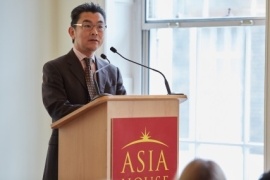
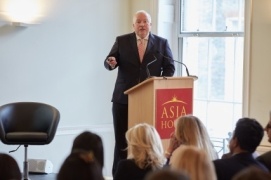
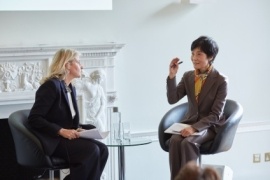
On Thursday 2 March 2017, the Embassy of Japan and Asia House co-hosted “The Female Economic Growth Factor”. This event was an opportunity to look back on the commitments made by the G7 countries at last year’s Ise-Shima Summit, where the capacity building of women in equitable economic growth was outlined as a key priority area and the G7 leaders agreed the G7 Guiding Principles for Capacity Building of Women and Girls, and to discuss ways to promote women’s participation in the Science, Technology, Engineering and Mathematics (STEM) fields.
The event was opened with remarks from the Minister for the Economic Section at the Embassy of Japan, Mr Hiroshi Matsuura, who introduced the efforts that the Japanese government have been making to engage women in economic growth. This includes the “Women’s Initiative in Developing STEM Careers”, known as WINDS, launched during Japan’s G7 presidency last year.
During his Keynote Address, Mr Willem Adema, Senior Economist in the Social Policy Division at the OECD, discussed the challenges facing countries such as Japan and the United Kingdom, including low female participation in the workforce, gender inequalities in working hours, and the gender pay gap. Mr Adema stressed the need for a change in attitudes and in workplace culture, where long working hours and the reluctance of fathers to take paternity leave can be a barrier to greater involvement of women in the economy.
The first discussion session was led by Ms Anita Hamilton from Hamilton Consulting, who welcomed two WINDS Ambassadors – Professor Reiko Kuroda from Tokyo University of Science, and Professor Averil MacDonald from the University of Reading.
Professor Kuroda explained how engaging women in the labour force, and making it easier for mothers to return to work, is becoming increasingly important for the Japanese economy. While there are a number of initiatives led by Prime Minister Shinzo Abe, it is taking a significant amount of time for those to filter down to society and into the working culture in Japan, she explained. She underlined the importance of conveying a passion for science to the younger generation.
Then Professor MacDonald gave an interesting account of the challenges in the UK and stressed the need to encourage more girls into STEM subjects by advertising the personal characteristics of those already working in the related areas. She also highlighted the influence that mothers have on their daughters’ careers, and emphasised the need for teachers and career advisers to be better trained in advising girls on their future career paths.
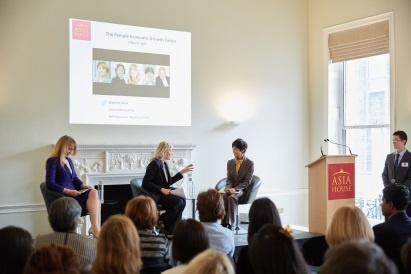
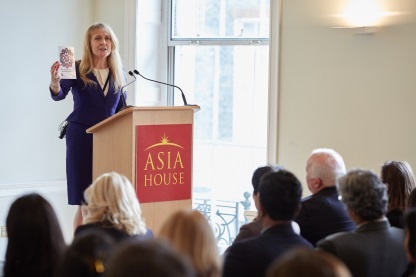
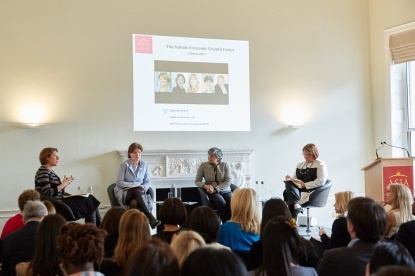
The second session – Women in the workplace: a reality check – was led by Ms Margaret Doyle, Head of Clients & Markets for Financial Services and Real Estate at Deloitte. Ms Barbara Rambousek, Associate Director for Economic Inclusion at the EBRD, introduced some of the work that the EBRD has been doing to improve the channels between education and careers for women, and emphasised the importance of forming partnerships between policy makers, companies and education systems to fill the skill gap in developing countries in particular.
Ms Vandita Pant, Group Treasurer and Head of Europe at BHP Billiton, discussed the ways in which BHP Billiton has shifted its mindset and is striving for a gender-balanced approach with commitment from the top of the organisation by setting measurable objectives for the company. Ms Lynn Collier, COO at Hitachi Data Systems, introduced some of the measures that Hitachi Group has taken to make their industry more attractive to women, including holding open days for girls from the local community to visit Hitachi factories and making the language of job ads and images on their website more female-friendly.
The event concluded with a networking reception, which was an opportunity for the 130-plus participants to continue their lively discussions in an informal setting.
Links to the conference videos:
The event was opened with remarks from the Minister for the Economic Section at the Embassy of Japan, Mr Hiroshi Matsuura, who introduced the efforts that the Japanese government have been making to engage women in economic growth. This includes the “Women’s Initiative in Developing STEM Careers”, known as WINDS, launched during Japan’s G7 presidency last year.
During his Keynote Address, Mr Willem Adema, Senior Economist in the Social Policy Division at the OECD, discussed the challenges facing countries such as Japan and the United Kingdom, including low female participation in the workforce, gender inequalities in working hours, and the gender pay gap. Mr Adema stressed the need for a change in attitudes and in workplace culture, where long working hours and the reluctance of fathers to take paternity leave can be a barrier to greater involvement of women in the economy.
The first discussion session was led by Ms Anita Hamilton from Hamilton Consulting, who welcomed two WINDS Ambassadors – Professor Reiko Kuroda from Tokyo University of Science, and Professor Averil MacDonald from the University of Reading.
Professor Kuroda explained how engaging women in the labour force, and making it easier for mothers to return to work, is becoming increasingly important for the Japanese economy. While there are a number of initiatives led by Prime Minister Shinzo Abe, it is taking a significant amount of time for those to filter down to society and into the working culture in Japan, she explained. She underlined the importance of conveying a passion for science to the younger generation.
Then Professor MacDonald gave an interesting account of the challenges in the UK and stressed the need to encourage more girls into STEM subjects by advertising the personal characteristics of those already working in the related areas. She also highlighted the influence that mothers have on their daughters’ careers, and emphasised the need for teachers and career advisers to be better trained in advising girls on their future career paths.



The second session – Women in the workplace: a reality check – was led by Ms Margaret Doyle, Head of Clients & Markets for Financial Services and Real Estate at Deloitte. Ms Barbara Rambousek, Associate Director for Economic Inclusion at the EBRD, introduced some of the work that the EBRD has been doing to improve the channels between education and careers for women, and emphasised the importance of forming partnerships between policy makers, companies and education systems to fill the skill gap in developing countries in particular.
Ms Vandita Pant, Group Treasurer and Head of Europe at BHP Billiton, discussed the ways in which BHP Billiton has shifted its mindset and is striving for a gender-balanced approach with commitment from the top of the organisation by setting measurable objectives for the company. Ms Lynn Collier, COO at Hitachi Data Systems, introduced some of the measures that Hitachi Group has taken to make their industry more attractive to women, including holding open days for girls from the local community to visit Hitachi factories and making the language of job ads and images on their website more female-friendly.
The event concluded with a networking reception, which was an opportunity for the 130-plus participants to continue their lively discussions in an informal setting.
Links to the conference videos:
- Keynote Address by Willem Adema, Senior Economist, OECD
- In conversation with Professor Averil MacDonald and Professor Reiko Kuroda
- Panel discussion with Vandita Pant, Barbara Rambousek and Lynn Collier

